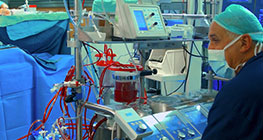

 Graduate training in Physiology aims at providing students with an understanding of the structure and function of the cells and organ systems of the body and the means by which these functions are regulated. Emphasis is placed on the acquisition of a sound basic training in general physiology through individually planned programs of course work, tutorials, seminars and supervised research. Instruction leading to the degree of Doctor of Philosophy is available in the following specialized areas: cellular neurophysiology, regulation of sleep and wakefulness, neural, endocrine and local control of the circulation and microcirculation, cardiac dynamics, cardiac metabolism, cardiac hypertrophy and failure, endocrinology, neuroendocrinology, renal physiology, oxygen metabolism, and the physiology of biological membranes.
Graduate training in Physiology aims at providing students with an understanding of the structure and function of the cells and organ systems of the body and the means by which these functions are regulated. Emphasis is placed on the acquisition of a sound basic training in general physiology through individually planned programs of course work, tutorials, seminars and supervised research. Instruction leading to the degree of Doctor of Philosophy is available in the following specialized areas: cellular neurophysiology, regulation of sleep and wakefulness, neural, endocrine and local control of the circulation and microcirculation, cardiac dynamics, cardiac metabolism, cardiac hypertrophy and failure, endocrinology, neuroendocrinology, renal physiology, oxygen metabolism, and the physiology of biological membranes.
Graduates with a degree in physiology can pursue careers in research, teaching or management in academia, the pharmaceutical and biotechnology industries, private research institutions, government science or regulatory agencies, or medicine and health care.
Further information on admissions and degree requirements, course offerings and research interests are available upon request from the Graduate Program Director.
Students may enter the Ph.D. program in one of three ways: (1) via our Integrated Ph.D. Program (IPP), which does not require a declaration of a major until the second year of study, (2) with advanced standing following the completion of one of the Graduate School’s Master’s programs, or (3) highly motivated and talented students from NYMC’s School of Medicine may be admitted to the dual-degree M.D./Ph.D. program.
Students must achieve an overall “B” average in physiology courses (core and elective) (GPA ≥ 3.00). Elective credits are normally earned only through advanced physiology courses (catalog #s 2000-7999), but upper level courses offered by other departments may qualify for elective credit with the approval of the physiology program director. Only didactic (letter-graded) courses may be used to fulfill elective credit requirements. PHYM 8010 (Journal Club) and PHYM 8020 (Seminar / Research Rounds) are taken each semester in residence. Research rotations (BMSM 9110 or PHYM 9110) are required in each track, as specified below. Following selection of a dissertation sponsor, students register for PHYM 9200 (Research Techniques) each semester until achieving candidacy, and PHYM 9900 (Doctoral Dissertation Research) each semester thereafter until the dissertation research is completed. View the course descriptions here.
The course requirements for students entering through the Integrated Ph.D. program or with Advanced Standing are the same. Advanced Standing students will add to the courses taken as an NYMC Master's student to complete their Ph.D. degree requirements, but are not required to participate in research rotations.
The M.D./Ph.D. program overview can be found in the M.D./Ph.D. section of our website.
Program Director:
Carl Thompson, Ph.D.
Basic Sciences Building - Room 611A
carl_thompson@nymc.edu
(914) 594-4106